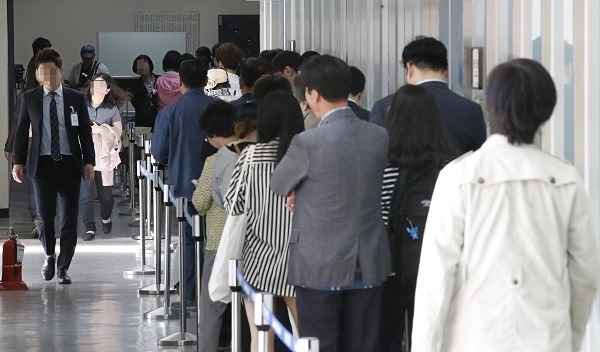Hundreds of South Koreans flocked to a court in Seoul on Friday to take part in a drawing for the opportunity to watch former President Park Geun-hye's first hearing next week.
Ahead of the hearing slated for Tuesday, the Seoul Central District Court held the drawing to randomly allocate spectator seats to prevent people from lining up for hours under the current first-come, first-served rule.

A total of 521 people ranging from college students to Park's avid supporters applied for the 68 seats available, recording a competition rate of 7.6 to one.
It will be Park's first public appearance since she was arrested at the end of March over a string of allegations, including bribery and abuse of power. She was removed from office on March 10.
"In terms of politics, we saw Park stepping down and a new president sworn in. I wanted to witness how this historical case is dealt with in the judiciary," said Lee Tae-gyeong, a freshman in college who came to the draw with two friends.
A 69-year-old Park supporter said he came from Incheon, west of Seoul, to gain a chance to see the former leader.
"The Constitutional Court's decision to oust Park was totally ridiculous," he claimed, asking to be identified only by his last name Yoo. "I will look into the eyes of judges this time and see if they are not biased."
The court held two preparatory sessions for Park's trial, but she did not show up as it was not mandatory.
Park is the country's third former president to stand trial over corruption allegations, after Chun Doo-hwan and Roh Tae-woo, who were convicted in the early 1990s. (Yonhap)





![[Herald Interview] 'Amid aging population, Korea to invite more young professionals from overseas'](http://res.heraldm.com/phpwas/restmb_idxmake.php?idx=644&simg=/content/image/2024/04/24/20240424050844_0.jpg&u=20240424200058)











![[KH Explains] Korean shipbuilding stocks rally: Real growth or bubble?](http://res.heraldm.com/phpwas/restmb_idxmake.php?idx=652&simg=/content/image/2024/04/25/20240425050656_0.jpg&u=)

